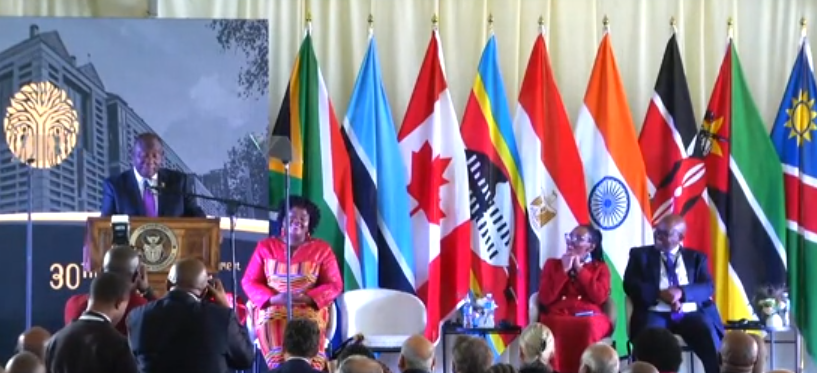Ramaphosa Backs Judiciary Funding, Reaffirms Commitment to Independence
The President made these remarks during the 30-year anniversary celebrations of the Constitutional Court, held at its iconic location on Constitution Hill, Braamfontein.

- Country:
- South Africa
President Cyril Ramaphosa has reaffirmed the South African government’s unwavering commitment to safeguarding the independence and integrity of the judiciary, announcing that funding for the judicial system will be prioritised, even amid the nation’s worsening fiscal pressures. The President made these remarks during the 30-year anniversary celebrations of the Constitutional Court, held at its iconic location on Constitution Hill, Braamfontein.
With South Africa grappling with slow economic growth, rising debt, and a shrinking revenue base, President Ramaphosa acknowledged that the state’s budgetary environment is increasingly constrained. However, he was resolute in assuring the public that democratic institutions—particularly the judiciary—will not be sidelined in national funding allocations.
“Money is getting tighter and tighter because our fiscal situation is challenged with the lacklustre growth of our economy. So, the revenues that come into government are becoming slimmer and slimmer. However, we do need to empower various arms of the state,” the President said.
Budget Protection for All Three Arms of State
President Ramaphosa emphasized that Parliament, the Judiciary, and the Executive—the three constitutional arms of government—will remain central in budgetary planning and allocation.
“Parliament and the judiciary are one of those, and the executive, of course, plays a leading role of the arms of the state. So, money will be made available—and of course, to the extent that we are able to mobilise the resources as we grow the economy,” he said.
This announcement comes amid growing concern that resource constraints may limit the National Prosecuting Authority’s (NPA) capacity to prosecute high-profile and complex cases, including those emerging from the findings of the Zondo Commission on State Capture.
Judiciary to Gain Full Control of Its Own Budget
In a landmark development, President Ramaphosa disclosed that the judiciary will soon have full control over its own budget, similar to the financial autonomy already enjoyed by Parliament. This move aims to insulate the judicial arm of government from political interference and enable it to operate independently and effectively.
“The judiciary will have the money, and they will be in control—just as Parliament is in control of its own budget. They will be able to embark on infrastructure projects, administrative capability training and all this without having to always go and ask for permission from the Minister of Justice,” the President explained.
This level of autonomy will allow the judiciary to plan and execute projects independently, including:
-
Court infrastructure upgrades
-
Judicial training programmes
-
Administrative and technological improvements
-
Case backlog reduction initiatives
Tribute to Leadership Behind Judicial Reform
President Ramaphosa attributed the progress on judicial financial autonomy to the efforts of Justice Minister Mmamoloko Kubayi and Chief Justice Mandisa Maya, whom he described as instrumental in "moving the needle" on the issue.
“If you have to pay tribute to anyone, it’s these two ladies who have really moved mountains,” he said.
He also acknowledged the foundational role played by former Chief Justice Raymond Zondo, under whose leadership the framework for judicial financial independence began to take shape.
“Former Chief Justice Raymond Zondo sought to have this put in place, and I think the foundation and the framework were laid in 2013. It was consolidated during Chief Justice Zondo’s time, and it is now being implemented under Chief Justice Maya,” the President noted.
A Broader Vision for Judicial Empowerment
The President’s commitment to funding and judicial autonomy is part of a broader vision to strengthen South Africa’s democratic institutions. He reiterated that a robust and independent judiciary is not a luxury but a cornerstone of the rule of law, and must be supported by institutional, financial, and legislative safeguards.
“To ensure that the judiciary executes its duties independently, effectively, and with dignity—government must and will provide a range of institutional, infrastructure, financial, administrative, and legal support,” he affirmed.
Context: Judicial Independence Amid Growing Public Expectations
The announcement arrives at a time when public trust in institutions is being tested by ongoing challenges including:
-
Delays in the prosecution of corruption cases
-
Infrastructure decay in court buildings
-
Limited access to legal services in rural areas
-
Backlogs in civil and criminal courts
The President’s renewed pledge to empower the judiciary could help restore confidence in the legal system, ensuring that it remains responsive to the needs of all South Africans.
Looking Ahead: Judiciary Poised for Greater Impact
With financial autonomy now within reach, the judiciary is expected to strengthen its operational capacity, enhance access to justice, and more effectively uphold constitutional rights.
The milestone also marks a turning point in how the state views its role in supporting—not controlling—the judiciary. This shift could pave the way for long-term reforms, including judicial digitisation, infrastructure renewal, and capacity building across all tiers of the court system.
- READ MORE ON:
- Cyril Ramaphosa
- Constitutional Court
- judicial independence
- South Africa judiciary
- financial autonomy
- Chief Justice Mandisa Maya
- Minister Mmamoloko Kubayi
- NPA
- judiciary budget
- rule of law
- Zondo Commission
- Parliament funding
- democratic institutions
- court infrastructure
- legal reform South Africa
ALSO READ
India, Canada vibrant democracies, bound by shared commitment to rule of law: MEA ahead of G7 meeting.
SC gives one-day time to Karnataka govt to apprise it about release of film 'Thug Life' in state, says rule of law must be established.
Mutual trust in democracy, rule of law form strong foundation of our ties, PM Modi on India-Cyprus relationship.
Democracy, rule of law, pluralism, equality are shared values that bind us: PM Modi in Croatia.










